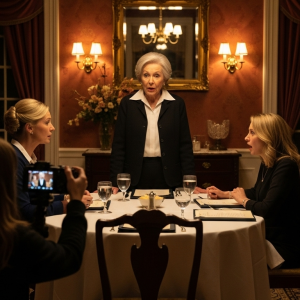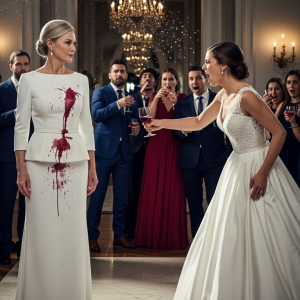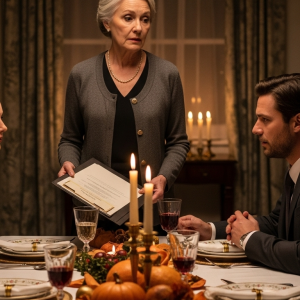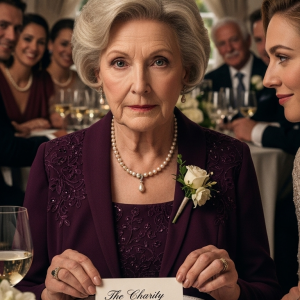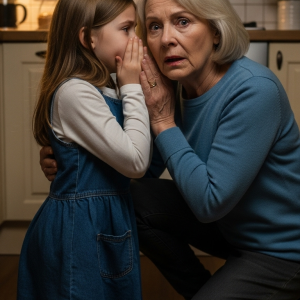When my daughter told me to “find somewhere else to die,” that I was useless now, I packed my bags like the obedient mother I had always been. Three days later, I was sitting in a lawyer’s office, discovering that my supposedly loving husband had played the longest and most brilliant game of chess in history. My daughter, Victoria, was about to learn that sometimes, the pawn becomes the queen.
Two months ago, I was Margaret Sullivan, devoted wife of forty-three years and mother to one spectacularly ungrateful daughter. When my husband, Robert, died of a heart attack, I thought my world was ending. Victoria swooped in during my grief like a vulture in designer clothes, cooing about how difficult this must be for me.
“Mom, you can’t possibly manage this big house alone,” she’d said, her voice dripping with fake concern. “The stairs, the maintenance, all those memories… It’s not healthy.” I should have seen the calculation behind her words. I was always just the woman who cooked and cleaned, while Victoria was Robert’s little princess who could do no wrong.
The final blow came last Tuesday. I had been living in what Victoria now called “our house” for six weeks, still sleeping in the guest room. She arrived unannounced with her husband, Kevin, and two large suitcases. “Mom, we’ve made a decision,” she declared. “Kevin got the promotion, and we need to move into town. This house is perfect for us.”
I stared at her, not comprehending. “Move in? But this is my home.”
Victoria’s mask of concern slipped, revealing the cold steel underneath. “Actually, Mom, according to Dad’s will, I inherited everything. The house, the investments, all of it. I’ve been letting you stay here out of kindness, but it’s time for you to find your own place.”
The words hit me like a physical blow. “Victoria, surely there’s been some mistake.”
“No mistake,” she said, her voice flat. “Dad knew I’d take better care of his legacy. You never understood money. You were just the wife.” Just the wife. Forty-three years, reduced to those three words. That’s when she delivered the killing blow. “Find somewhere else to die. You’re useless now.”
I packed my things in a daze. Forty-three years of marriage fitting into two suitcases and a small box of photos. Victoria watched from the doorway, checking her watch. “There’s a nice senior complex on Maple Street,” she offered brightly. “Very affordable.” My daughter was inheriting what I thought was millions, and she was suggesting I check into a welfare facility.
Kevin loaded my suitcases into their BMW like he was disposing of garbage. The Sunset Inn was exactly what you’d expect for $49 a night: thin walls, thinner towels, and a carpet that had seen better decades. Victoria handed me $200 in cash. “This should cover you for a few days,” she said, the way one might tip a maid.
After they left, I sat on the sagging mattress. In three hours, I’d gone from grieving widow to homeless senior citizen. The woman I had raised had discarded me like an expired prescription. But as I sat in that depressing room, something nagged at me. Robert had been meticulous. He had shown me the will years ago, and I was absolutely certain that’s not what it had said. He was traditional, sometimes stubborn, but he wasn’t cruel.
The next morning, I used the motel’s Wi-Fi to find Robert’s attorney, Harrison Fitzgerald. His office was a twenty-minute bus ride downtown. Harrison was a distinguished man in his seventies with kind eyes. When his secretary announced me, he looked genuinely surprised. “Margaret, my dear! I was wondering when you’d come in. I tried calling your house, but Victoria said you were traveling.”
“Traveling?” The lie was so effortless. “Mr. Fitzgerald, I need to ask you about Robert’s will.”
He looked puzzled. “Of course. Didn’t Victoria provide you with your copy? I gave her the original and several copies after the reading.”
My stomach dropped. “There was a reading?”
“Margaret, you were supposed to be there. Victoria said you were too distraught, that she would handle everything and make sure you received your inheritance.” The blood drained from my face. “Mr. Fitzgerald, I was never told about a reading. Victoria told me she inherited everything.”
Harrison’s expression shifted from confusion to alarm. He reached for a thick file. “Margaret, that’s impossible.” He pulled out a document, and I recognized Robert’s neat signature. As Harrison began to read, I realized Victoria hadn’t just lied; she had constructed an entirely different reality.
“I, Robert James Sullivan… do hereby bequeath to my beloved wife, Margaret Anne Sullivan, the following: our primary residence at 847 Oakwood Drive… Additionally, I leave her seventy percent of all financial assets, investments, and accounts, totaling approximately $23 million.”
My head started spinning. Twenty-three million dollars. The house. Harrison continued, his voice growing more serious.
“To my daughter, Victoria Sullivan Hayes, I leave $10 million, to be held in trust with distributions beginning on her 45th birthday, contingent upon her treatment of her mother following my death.”
Contingent upon her treatment of me. Robert had known. Somehow, he had anticipated his daughter’s greed. “Mr. Fitzgerald,” I whispered, “Victoria told me I inherited nothing. She moved into my house. She gave me $200.”
The elderly lawyer’s face flushed with anger. “Margaret, what Victoria has done is called elder abuse and fraud. Your husband updated his will six months before his death, specifically because he was concerned about Victoria’s sense of entitlement.” He paused. “There’s more. The provision specifically states that if she fails to treat you with respect and dignity, the entire $10 million reverts to you instead.”
I stared at him in shock.
“I’m saying,” Harrison smiled, “your daughter just cost herself $10 million. You’re not inheriting $23 million, Margaret. You’re inheriting $33 million, plus the house.” The irony was staggering. Victoria’s greed had triggered the very clause designed to protect me from it.
“What do I do now?” I asked, my voice barely a whisper.
“Now, my dear,” Harrison said, his eyes gleaming, “we call the police. And then we call Victoria and inform her that she’s about to receive the shock of her life.”
Harrison Fitzgerald’s office became what he cheerfully called “Operation Justice.” Within two hours, every account had been frozen. Victoria’s credit cards were declined. The house utilities, which she’d already transferred to her name, were suspended. My phone rang at exactly 3:47 p.m.
“Mom, where are you? There’s some kind of mixup with the bank accounts!”
“Hello, Victoria. I’m sitting in Harrison Fitzgerald’s office. You remember him? Daddy’s attorney? The one who read the real will while you told him I was ‘traveling’?”
There was a moment of stunned silence. Then, her voice turned sharp, desperate. “Mom, you’re confused. The grief has been overwhelming. Someone is taking advantage of you.” Even caught, she tried to manipulate me.
“Victoria, dear, let me clarify. Not only did you not inherit the house and the bulk of the estate, but your actual $10 million inheritance is now legally mine, thanks to that lovely clause about treating me with dignity.”
“That’s impossible!”
“Detective Rodriguez is sitting right here if you’d like to discuss the impossibility of fraud charges with her.”
The phone went quiet. “Mom, please,” she finally said, “can we meet and talk about this reasonably?”
“Oh, we’ll definitely be meeting. At the courthouse, when you’re arraigned.” A cold, final resolve crystallized in my chest. “You wouldn’t dare press charges against your own daughter,” she spat.
“Watch me,” I said, and hung up.
The police arrested Victoria that evening while she was celebrating her “inheritance” at a fancy restaurant. Kevin was arrested at his office the next morning; forensic accountants had traced the forgeries to a company his firm used for creating fraudulent investment documents.
I spent my first night back in my house, sleeping in my own bed. Victoria had already moved her designer clothes into my closet. I packed them into garbage bags and left them on the front porch.
But just as I started to feel a sense of control, the other shoe dropped. Kevin’s mother, Eleanor Hayes—a woman dripping with entitlement—showed up at my door. “Margaret,” she announced, “we need to discuss this situation rationally.” She offered me a settlement: $5 million to drop the charges against Kevin.
“My answer is no,” I said firmly.
Her polished facade cracked. “Very well. But you should know that Kevin’s legal team has found some… interesting information about your husband’s business practices. It would be unfortunate if that became public.” The threat was clear.
A private investigator confirmed my worst fears. “Mrs. Sullivan,” she told me, “your husband was running a sophisticated money laundering operation. We’re talking millions in illegal transactions.”
The room spun. Robert, the most honest man I knew, was a criminal. “The $10 million Robert left Victoria,” the investigator continued, “that money came directly from laundered funds. If the FBI discovers this, they’ll seize everything.”
My daughter and her husband weren’t just thieves. They were holding a nuclear weapon over my head. My phone rang. It was Victoria. “Mom, we need to meet. There are things you need to know about Daddy that change everything.”
“I already know, Victoria.”
“Then you know Kevin’s lawyers have been in contact with the FBI,” she said, her voice confident again. “They’re willing to make a deal. Kevin gets immunity for providing information on Daddy’s network. You get to keep $5 million and the house. The fraud charges disappear. We all walk away.”
It was brilliant, in a sociopathic way. She was asking me to help her profit from her crimes by exploiting her father’s. “The alternative,” she added coolly, “is losing everything and potentially facing charges yourself.”
After hanging up, I sat in the darkness of Robert’s study, surrounded by the evidence of his double life. I had been married to a stranger, and my daughter had inherited his talent for deception. But she’d made one crucial mistake. She had underestimated who I was when my back was against the wall.
I picked up the phone and dialed the private investigator. “Carol,” I said, my voice clear and steady, “how quickly can you get me a meeting with the FBI? I have a story to tell them, and I think they’re going to find it very interesting.”
FBI Agent Sarah Martinez was serious, intelligent, and completely immune to charm. She sat across from me in Harrison’s conference room. “Mrs. Sullivan,” she said, “you understand that by coming forward, you’re potentially admitting to benefiting from criminal proceeds?”
“I understand,” I replied. “But I’d rather tell you the truth than let my daughter manipulate this situation to her advantage.”
I laid out everything: Robert’s hidden business, Victoria’s fraud, and the extortion attempt masquerading as a settlement. “She thinks I’ll cooperate because I’m afraid of losing everything,” I finished.
Agent Martinez smiled for the first time. “Are you afraid, Mrs. Sullivan?”
“Agent Martinez, two weeks ago, I was a grieving widow sleeping in a budget motel. Today, I’m voluntarily confessing my dead husband’s criminal enterprise to the FBI. Fear is no longer my primary emotion.”
“What is?”
“Anger. Pure, crystallized anger.”
Her smile widened. “Mrs. Sullivan, there’s something you should know about your husband’s operation. Something that changes everything.” She opened a thick file. “Your husband wasn’t just laundering money for the Torino crime family. For the past twelve years, he was an FBI informant.”
The world tilted on its axis. Robert, working for the FBI?
“The operation was highly sensitive,” she continued. “Your husband was helping us build cases against multiple crime families. The FBI allowed him to keep a percentage of the laundered funds as payment and to maintain his cover. Everything he left you was earned through legitimate federal cooperation. The $33 million is legally and cleanly yours.”
I stared at her, speechless. Victoria and Kevin had been planning to blackmail me with information that would have actually exonerated my husband.
“Mrs. Sullivan,” Agent Martinez said, leaning forward, “would you be willing to wear a wire?”
Three hours later, I was sitting in my living room with a recording device taped to my chest, waiting for Victoria and Kevin. They arrived dressed for a business dinner, Kevin carrying a briefcase full of what he thought were immunity agreements.
“Mom, you look better than you have in weeks,” Victoria said, kissing my cheek.
“Clarity has that effect,” I replied.
Kevin opened his briefcase. “Margaret, our lawyers have structured this very favorably for you. You retain the house, five million in clean assets, and complete immunity.”
“Clean assets,” I mused. “That’s an interesting phrase.”
“The important thing is that we’re all protected,” Victoria chimed in. “The past stays buried.”
“What about the thirty-three million Robert actually left me?” I asked.
“Mom, that money is tainted,” she said, her tone condescending. “Taking five million is the best possible outcome.”
“And you two?” I asked. “What do you get?”
“We get to put this unfortunate misunderstanding behind us,” Kevin said smoothly. He was still calling felony fraud a misunderstanding.
“Help me understand something, Kevin,” I said, leaning forward. “When exactly did you discover Robert’s criminal activities? Was it before you married my daughter, or only recently, while you were planning to steal my inheritance?”
They exchanged a nervous glance. “I don’t think that’s relevant,” Kevin said.
“Actually, I think it is. Because Agent Martinez finds it quite plausible.”
The color drained from both of their faces. “Agent Martinez?” Kevin whispered.
“FBI,” I clarified. “She’s been very interested in my story about systematic elder abuse, fraud, and extortion. Particularly the part where you tried to blackmail me with my dead husband’s crimes.”
“Margaret, this conversation is over,” Kevin said, standing abruptly.
“Actually, Kevin, I think it’s just beginning.”
On cue, Agent Martinez and two other federal agents entered the living room. “Victoria Sullivan Hayes and Kevin Hayes,” Agent Martinez announced, “you’re under arrest for conspiracy to commit wire fraud, elder abuse, and attempted extortion of a federal witness.”
Victoria turned to me, her face a mask of betrayal. “Mom, how could you do this to your own family?”
“The same way you could forge legal documents and steal my inheritance, sweetheart,” I replied. “Except my way is legal.”
Six months later, I stood in my renovated kitchen, making coffee. The morning sun streamed through new windows, illuminating countertops I had chosen myself. The past six months had been a whirlwind. Victoria and Kevin were each serving eighteen-month federal sentences. The news coverage had made me a minor celebrity in senior advocacy circles.
My financial advisor, Sarah, sat at my new breakfast table. “Your portfolio is performing excellently,” she said. “The charitable foundation is fully operational.” The Margaret Sullivan Foundation for Elder Protection had become my new purpose. Using $15 million of my inheritance, we were funding legal aid for seniors facing family financial abuse.
“And Victoria?” Sarah asked carefully. “She’s written again. She wants to apologize.”
Victoria had written seventeen letters from federal prison. I’d stopped opening them after the first few. “Sarah, has my stance on that changed?” I asked.
“Not according to our previous conversations,” she admitted.
“Good. Some relationships, once broken, can’t be repaired with words.” The woman I had been six months ago—grieving, dependent, desperate for approval—might have felt obligated to forgive. That woman was gone.
“I am thinking about the grandchildren,” I continued. “My relationship with them will be based on their choices when they’re adults, not on their mother’s rehabilitation efforts.”
After Sarah left, I walked through my house. My house, decorated to my taste, organized around my priorities. In my new art studio, I uncovered my latest painting: a self-portrait of a woman standing in bright sunlight, her face turned toward the future. She looked nothing like the grieving widow who’d packed her life into two suitcases. This woman looked powerful, independent, and unafraid.
She looked like someone who had learned that the best revenge isn’t getting even. It’s becoming everything your enemies never thought you could be. Outside, the sun was setting on a life I had chosen, on property I had defended with intelligence and courage. And if Victoria wanted to rebuild a relationship with this new woman, she would need to bring a lot more than prison letters and hollow apologies. She would need a complete transformation, one that matched my own.
